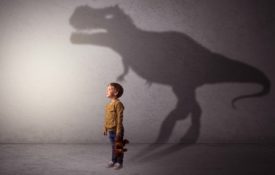-

Do Lockdown Drills Create Anxiety? New Research Says No
Podcast: Dr. Amanda Nickerson joins Under the Cortex to explore the developmental pathways and risk factors for being exposed to gun-related violence.
-

New Research From Clinical Psychological Science
A sample of research on cognitive inhibition in trauma recovery among asylum seekers, stress accumulation and sleep problems among Black Americans, parent and child depressive symptoms, and much more.
-
Stressed Out? It Might Not Just Be In Your Head. How Your Muscles Affect Your Mood
A lot of us associate our neck and back pain with spending hours hunched over our devices. We also know that good posture and core strength can help prevent those aches and pains. But researchers say it can also help us feel less stress. It all comes down to the inner part of our adrenal glands—the adrenal medulla—which releases adrenaline into the body, says Peter Strick, a leading neuroscientist at the University of Pittsburgh. When we're stressed, the brain sends a signal to the adrenal medulla. That signal triggers the fight-or-flight response: increased heart rate, increased blood pressure, nausea, and other unpleasant symptoms. ...
-
A New Way to Inspire People to Get a COVID Vaccine
Here we go again: respiratory virus season. For the first time this year, though, we have vaccines against our big three threats: flu, RSV and COVID. But vaccines in vials do not equal vaccinations in arms. Only 17 percent of Americans got last fall’s COVID vaccine. What do we do in a time of extreme fatigue, loss of trust, disinformation, politicization and lack of public health funds for education and outreach? There is a solution.
-
How an ‘Effort-Reward Imbalance’ Can Make Work Miserable
Life isn’t fair. It’s a phrase so often repeated that it has become a cliché. But studies have shown that humans are hard-wired to want their fair share, as are other animals that have cooperative relationships, like monkeys, birds and wolves. In one famous experiment, researchers trained two capuchin monkeys to hand them tokens in exchange for a cucumber snack. At first, the animals were happy with this arrangement — that is, until one of the monkeys received grapes instead, which are considered far more delicious. The other monkey, who continued to receive cucumbers, looked enraged, shook the walls of her enclosure and hurled the cucumbers out of reach.
-

From Unseen Animals to Theoretical Physics, Humans Have a Unique Ability to Communicate Absent and Abstract Concepts
Our ability to use words and gestures to communicate information about absent and abstract concepts begins in infancy and could be what allows us to develop more abstract thinking as we age.

